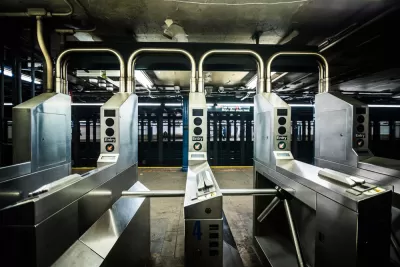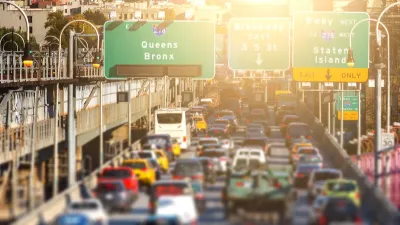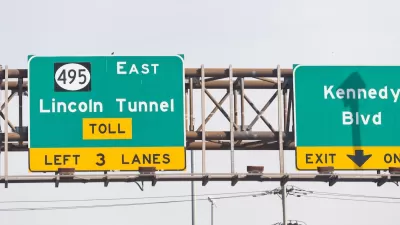In the continuing debate over congestion pricing in New York, Adele Peters asks if transit advocates are stopping short of what they should be asking for: free transit for all of New York.

It's been a rough year for the MTA. Between service failures and falling ridership, many are looking for a way to buoy public transit in New York. Some transit proponents have argued for congestion pricing, but Mayor Bill de Blasio continues to oppose the idea.
"But a report at the time, commissioned by mass transit advocate Theodore Kheel, suggested that a fee on drivers would not only reduce traffic and save the city billions by regaining the productivity of people previously stuck in gridlock, but would be able to pay for free public transportation for everyone else," Adele Peters writes for Fast Company. This is beyond what some have asked for. "The fees could help repair and upgrade the city’s struggling subway system. The idea of free public transit is less likely to ever happen," Peters writes. But that is what Mayor Bloomberg described wanting when he discussed the idea during his term.
For his part, de Blasio suggests funds for the MTA could come from a "millionaire's tax" that would subsidize transit passes for those who can’t afford tickets, Peters reports. But this system would do nothing to curb traffic or creates incentives for transit before the improvements can be made. Peters argues that transit's role will be just as important in the future: "Even if cars are shared, electric, and self-driving, subways and buses still have advantages, including keeping roads less congested. Cities will need to find ways to make those traditional services competitive, and that might eventually mean lower–or even free–fares."
FULL STORY: Should Public Transit Be Free?

Alabama: Trump Terminates Settlements for Black Communities Harmed By Raw Sewage
Trump deemed the landmark civil rights agreement “illegal DEI and environmental justice policy.”

Planetizen Federal Action Tracker
A weekly monitor of how Trump’s orders and actions are impacting planners and planning in America.

How Atlanta Built 7,000 Housing Units in 3 Years
The city’s comprehensive, neighborhood-focused housing strategy focuses on identifying properties and land that can be repurposed for housing and encouraging development in underserved neighborhoods.

In Both Crashes and Crime, Public Transportation is Far Safer than Driving
Contrary to popular assumptions, public transportation has far lower crash and crime rates than automobile travel. For safer communities, improve and encourage transit travel.

Report: Zoning Reforms Should Complement Nashville’s Ambitious Transit Plan
Without reform, restrictive zoning codes will limit the impact of the city’s planned transit expansion and could exclude some of the residents who depend on transit the most.

Judge Orders Release of Frozen IRA, IIJA Funding
The decision is a victory for environmental groups who charged that freezing funds for critical infrastructure and disaster response programs caused “real and irreparable harm” to communities.
Urban Design for Planners 1: Software Tools
This six-course series explores essential urban design concepts using open source software and equips planners with the tools they need to participate fully in the urban design process.
Planning for Universal Design
Learn the tools for implementing Universal Design in planning regulations.
Caltrans
Smith Gee Studio
Institute for Housing and Urban Development Studies (IHS)
City of Grandview
Harvard GSD Executive Education
Toledo-Lucas County Plan Commissions
Salt Lake City
NYU Wagner Graduate School of Public Service




























